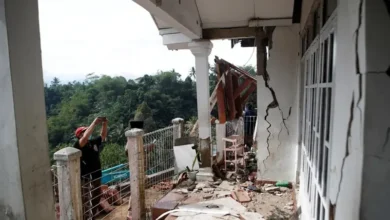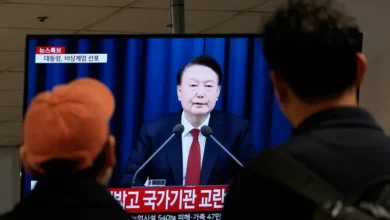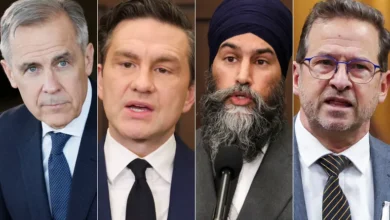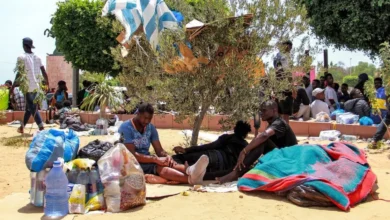India’s Rahul Gandhi disqualified from parliament
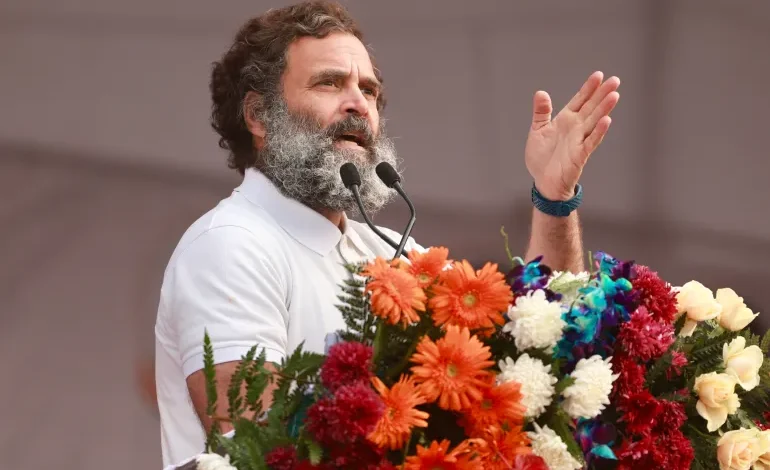
India’s main opposition leader Rahul Gandhi has been disqualified as a member of parliament, a day after being convicted in a defamation case and sentenced to two years in jail.
“Rahul Gandhi… stands disqualified from the member of Lok Sabha from the date of his conviction,” a notice issued by the parliament said on Friday, referring to the lower house.
Gandhi, 52, was found guilty for a speech ahead of the 2019 general election in which he referred to thieves as having the surname Modi.
Gandhi, a scion of the Nehru-Gandhi family and former president of the Congress party, will appeal in a higher court, the party said.
‘BJP fearful of Gandhi’s rise’
Congress officials have described the court order as politically motivated and accused Prime Minister Narendra Modi and the ruling Bharatiya Janata Party (BJP) of targeting political opponents.
“This battle will be fought both legally and politically,” said Congress spokesman Pawan Khera.
Earlier on Friday, Congress members held protests in some parts of the country against Gandhi’s conviction and two-year-old jail sentence.
Modi’s government has been widely accused of using the defamation law to target and silence critics. The case in Gujarat is one of several lodged against Gandhi, Modi’s chief opponent.
“The BJP is fearful about the rise of Rahul Gandhi and he poses a direct threat to the Modi government,” said Pradip Bhattacharya, a Congress legislator from West Bengal state.
“Black Day for Indian Democracy!” Srinivas Bhadravathi Venkata, president of the party’s youth wing, wrote on Twitter.
BJP president J P Nadda dismissed the charges, saying that Gandhi insulted a section of Indians who happen to share the same surname as Prime Minister Modi.
“It is one thing to question government regarding the policies, that would be considered a healthy debate, but clearly the Congress has never followed such rules,” he told Reuters news agency.
Leading face of Congress
Gandhi is the leading face of the Congress party, once the dominant force of Indian politics, with a proud role in ending British colonial rule, but now a shadow of its former self.
He is the scion of India’s most famous political dynasty and the son, grandson and great-grandson of former prime ministers, beginning with independence leader Jawaharlal Nehru.
But he has struggled to challenge the electoral juggernaut of Modi and its nationalist appeals to the country’s Hindu majority.
Thursday’s case stemmed from a remark made during the 2019 election campaign in which Gandhi had asked why “all thieves have Modi as (their) common surname”.
His comments were seen as a slur against the prime minister, who went on to win the election in a landslide.
Members of the government also said the remark was a smear against all those sharing the Modi surname, which is associated with the lower rungs of India’s complex caste hierarchy.
Gandhi faces at least two other defamation cases in the country and a money laundering case that has been snaking its way through India’s glacial legal system for more than a decade.
What does the defamation law say?
The Representation of the People Act, 1951, the law that governs elections in India, mandates the disqualification of any politician who is “convicted of any offence and sentenced to imprisonment for not less than two years”.
Gandhi was on Thursday found guilty of defamation. The disqualification comes into effect from the date of conviction.
“If it (the court) only suspends the sentence, that is not enough. There has to be a suspension or stay of conviction. He (Gandhi) can stay on as a member of parliament only if there is a stay on the conviction,” said Sibal, who is also a former member of the Congress party.
Can Gandhi contest elections?
Gandhi now faces the risk of not being able to contest national elections due in 2024 if his conviction is not suspended or overturned by a higher court before the elections.
The law also mandates that a convicted legislator cannot contest elections for six years after the end of their jail sentence.
Gandhi represents the Wayanad constituency in the southern state of Kerala.
On Friday, at least 14 opposition parties moved the Supreme Court alleging a misuse of federal investigative agencies by Modi’s government.
Last month, federal investigators arrested Manish Sisodia, a top member of the Aam Aadmi Party (AAP) which governs Delhi, on allegations he had corruptly benefitted from reforms to the capital’s liquor licensing rules.
Also in February, Indian tax authorities raided the BBC’s local offices, weeks after the broadcaster aired a documentary on Modi’s role during the 2002 Gujarat riots when he was the state’s chief minister.
The Editors Guild of India then said the raids were part of a wider “trend of using government agencies to intimidate or harass press organisations that are critical of government policies”.
